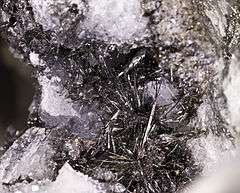Jamesonite
| Jamesonite | |
|---|---|
|
Jamesonite crystals | |
| General | |
| Category | Sulfosalt |
| Formula (repeating unit) | Pb4FeSb6S14 |
| Strunz classification | 2.HB.15 |
| Crystal system | Monoclinic |
| Crystal class |
Prismatic (2/m) H-M symbol: (2/m) |
| Space group | P21/a |
| Identification | |
| Color | gray-black |
| Cleavage | {001} good; also possibly {010} and {120} |
| Mohs scale hardness | 2½ |
| Luster | metallic |
| Streak | gray-black |
| Diaphaneity | opaque |
| Specific gravity | 5.63 |
Jamesonite is a sulfosalt mineral, a lead, iron, antimony sulfide with formula Pb4FeSb6S14. With the addition of manganese it forms a series with benavidesite.[1] It is a dark grey metallic mineral which forms acicular prismatic monoclinic crystals. It is soft with a Mohs hardness of 2.5 and has a specific gravity of 5.5 - 5.6.[2] It is one of the few sulfide minerals to form fibrous or needle like crystals. It can also form large prismatic crystals similar to stibnite with which it can be associated. It is usually found in low to moderate temperature hydrothermal deposits.[1]
It was named for Scottish mineralogist Robert Jameson (1774–1854). It was first identified in 1825 in Cornwall, England.[3] It is also reported from South Dakota and Arkansas, US; Zacatecas, Mexico; and Romania.
References
- 1 2 http://rruff.geo.arizona.edu/doclib/hom/jamesonite.pdf Handbook of Mineralogy
- ↑ Webmineral data
- ↑ Mindat
External links
| Wikimedia Commons has media related to Jamesonite. |
